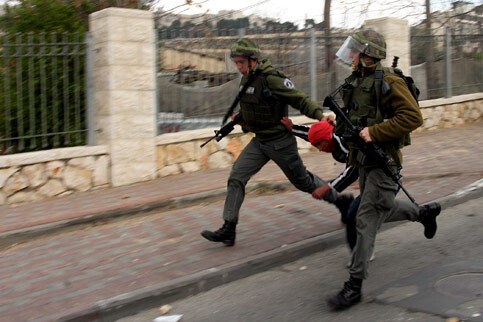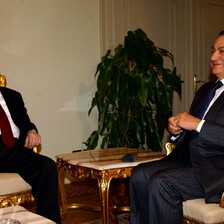The Electronic Intifada 7 March 2007

Israeli border police officers detain a Palestinian youth during clashes just outside the Old City of Jerusalem, 16 February 2007. Israeli police and Palestinian Muslims clashed in the Old City of Jerusalem on Friday over the Israeli authorities’ ongoing controversial excavations taking place close to Al-Aqsa Mosque. (MaanImages/Moti Milrod)
CAIRO, Mar 7 (IPS) - In a rare show of unity, parties from across the political spectrum have condemned reported Israeli violations against Jerusalem’s al-Aqsa mosque. They have warned of “dire consequences” if the site — the third holiest in Islam — were to be damaged.
“Jihad [holy war] becomes incumbent on Muslims when violence is done against them or their holy places, dignity or possessions,” Mohamed Tantawi, grand sheikh of Cairo’s venerable al-Azhar University declared in a departure from his usually non-confrontational position.
But despite a number of strongly worded statements from the foreign ministry, local observers say that Cairo’s official response to the violations has been typically weak.
“Egypt’s reaction has hardly been proportional to Israel’s ongoing plan to destroy the mosque,” Magdi Hussein, chairman of the frozen opposition Labour Party told IPS.
Israeli bulldozers began demolishing the ancient al-Maghariba walkway leading to the precincts of al-Aqsa Feb. 7. Israeli authorities said this was under an ongoing renovation scheme, but Muslim leaders claimed the digging was a first step towards demolition of the mosque.
“They are acting … inch by inch, stone by stone, until they demolish al-Aqsa mosque,” Raed Salah, head of the Islamic movement in Israel was quoted as saying in the state press. “Then, later, they will claim it collapsed naturally or as the result of an earthquake.”
Muslim outrage was not confined to Israel and the Palestinian territories next door.
On the same day, the Cairo-based Assembly for Islamic Studies headed by al-Azhar’s Tantawi condemned the Jewish state’s “hostile actions” against the holy site. In a statement, the group called for “intervention by the UN Security Council and concerned international institutions” to put a halt to the digging.
Cairo was also quick to register its discontent on a diplomatic level. On Feb. 8 foreign minister Ahmed Aboul-Gheit summoned Israel’s ambassador to Egypt. He was informed of “Egyptian displeasure with recent Israeli actions,” according to government broadsheet al-Ahram.
The situation took a turn for the worse the next day when Israeli authorities barred Palestinian worshippers from attending Friday prayers at the contested site. Clashes broke out after Israeli riot police using teargas and stun-grenades entered the precincts of the mosque after worshippers refused to vacate the area. Dozens were reportedly injured in the ensuing violence.
On the same day, Egypt’s Muslim Brotherhood, along with a handful of other opposition parties, attempted to organise a demonstration at Cairo’s al-Azhar mosque in solidarity with their Palestinian compatriots. Fearing a violent protest the authorities, in an emulation of Israeli tactics, forbade worshippers from entering the building.
After limited clashes between police and angry worshippers, 19 people were reportedly arrested. Demonstrations of varying intensity were reported in several other areas of the country the same day, including Alexandria and the upper Egyptian governorate Assiut.
The Feb. 10 edition of independent daily al-Masri al-Youm contentiously featured pictures of the disturbances at al-Azhar alongside those of the clashes in Jerusalem.
The situation came to a head in a lively session in parliament Feb. 12 when a request by Muslim Brotherhood members of parliament to debate the al-Aqsa issue was rejected by Parliament Speaker Fathi Sorour, a prominent member of the ruling National Democratic Party (NDP).
The issue was finally raised only after Brotherhood representatives, who control roughly one-fifth of the assembly, threatened to walk out of the chamber in protest.
Despite the ruling party’s initial disinclination to discuss the matter, NDP parliamentarians soon vied with their Islamist counterparts in condemning the Hebrew state and its alleged targeting of al-Aqsa. “No matter what we do, war with Israel is inevitable,” thundered one NDP representative.
MPs from across the political spectrum called for diplomatic retaliation, urging the closure of the Israeli embassy in Cairo, the withdrawal of the Egyptian ambassador from Tel Aviv and cancellation of the Qualified Industrial Zone (QIZ) free-trade agreement that Egypt signed with Israel and the United States in late 2004. Some parliamentarians called for an emergency Arab summit to deal with perceived threats to the Islamic landmark.
Local observers, however, play down the likelihood that Cairo — a longstanding ally of the United States — will take any significant diplomatic action against Israel.
“There’s little hope that parliament will actually decide to suspend relations or expel the ambassador,” Gamal Zahran, head of the political science department at Suez Canal University and independent MP told IPS. “Israel knows all too well that Egypt’s parliament is entirely controlled by the government and the government answers to the President.”
According to Mohamed Basyouni, former Egyptian ambassador to Israel and head of the Committee for Arab affairs, expulsion of the ambassador would be of little help in solving the al-Aqsa crisis. “The solution lies in sitting down and negotiating a final settlement to the Palestinian problem,” Basyouni told IPS.
In contrast to Cairo’s tepid official reaction, there have been numerous popular demonstrations against alleged threats to the holy site. Within the last two weeks, major demonstrations have again been held at al-Azhar, with the notable absence of police interference. On Feb. 19, teachers and students at Cairo University also held a major protest on campus.
Although Tel Aviv has since announced that it would suspend excavation work in the contested area, most Egyptian observers remain unconvinced short of substantial guarantees.
“The bulldozers might be gone, but digging is still underway by hand,” said Basyouni.
“Israel still aims to demolish al-Aqsa,” said Hussein. “And soon any small tremor or earthquake in the region will be enough to bring it down.”
Most recently, on Mar. 4, Egyptian archaeology czar Zahi Hawas joined the mounting chorus of criticism. “No one in the world would accept what Israel is currently doing in Jerusalem,” Hawas was quoted as saying by al-Masri al-Youm.
All rights reserved, IPS – Inter Press Service (2007). Total or partial publication, retransmission or sale forbidden.
Related Links


